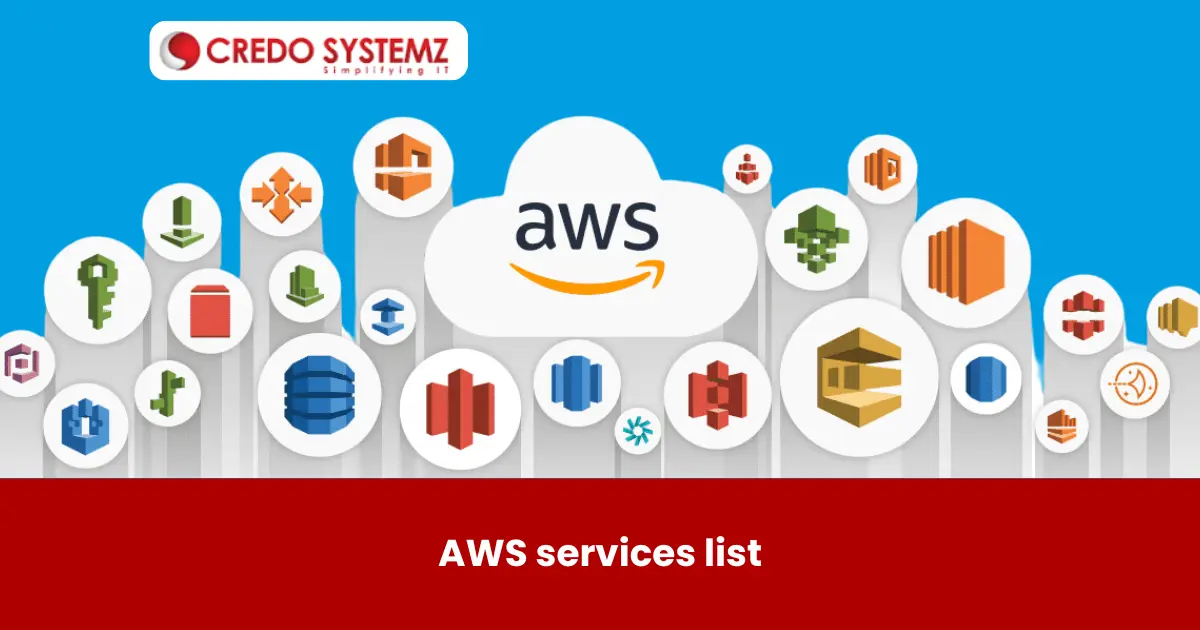
Introduction
Amazon Web Services (AWS) is one of the most widely adopted cloud platforms in the world. It offers over 200 fully featured on-demand cloud computing services globally. AWS is the preferred choice for various industries, including technology, healthcare, finance, and retail. Let’s understand the key AWS services based on categories to fulfill the various needs of businesses and developers.
Compute
To provide foundational infrastructure and computing services for applications in the cloud.
AWS Compute ServicesAmazon EC2 (Elastic Compute Cloud)
To launch scalable virtual servers in the cloud. It offers resizable compute capacity with CPU, storage, memory and networking.
AWS Lambda (Elastic Compute Cloud)
Run code without managing servers and pay for only the compute time. Manages the compute resources automatically.
Amazon ECS (Elastic Container Service)
To run containerized applications on AWS using this highly scalable container orchestration service.
Amazon EKS (Elastic Kubernetes Service)
Managing, deploying, scaling containerized applications by running Kubernetes service on AWS.
Lightsail
Serverless compute engine for containers with virtual servers, storage, networking and databases.
Storage
Advanced services and features to store, manage and secure data in the cloud.
- Amazon S3 (Simple Storage Service)
- Amazon EBS (Elastic Block Store)
- Amazon EFS (Elastic File System)
S3 (Simple Storage Service)
Object storage service to store any amount of data with
- Data backup and archiving
- Big data analytics
- Content storage
- Data recovery and retrieval
EBS (Elastic Block Store)
Block persistent storage volumes with EC2 instances for various use cases, like:
- Databases
- File systems
- High-performance storage applications.
EFS (Elastic File System)
Scalable file storage service to access the file system simultaneously. This AWS cloud service supports:
- Content management
- Home directories
- Big data analytics
- Web serving.
Amazon FSx
Fully managed third-party file storage system that is suitable for:
- High performance computing
- Machine learning
- Windows based applications.
Databases
To meet the various application requirements with various database services, such as
- Amazon RDS (Relational Database Service),
- Amazon DynamoDB
- Amazon Aurora
- Amazon Redshift
- Amazon ElastiCache.
Amazon RDS (Relational Database Service)
Managed relational database service for multiple database engines, like MySQL, PostgreSQL, MariaDB, Oracle, and SQL Server.
Amazon DynamoDB
Fully managed NoSQL database service which is suitable for mobile apps, gaming, IoT applications and real time analytics.
Amazon Aurora
High-performance, MySQL and PostgreSQL-compatible relational database engine with automatic replication and backup.
Amazon Redshift
Fully managed data warehouse service with parallel processing, automated backups, and columnar storage technology.
Amazon ElastiCache
In-memory data store and caching service to achieve high throughput, automatic scaling for Redis and Memcached.
Networking & Content Delivery
To build, manage, and optimize network infrastructure with secure delivery of applications and content.
Amazon VPC (Virtual Private Cloud)
Launch AWS resources in a virtual network with subnets, internet gateways,VPN connections and route tables.
Amazon CloudFront
Content delivery network (CDN) service to perform delivery of data securely with high transfer rates.
AWS Direct Connect
Dedicated network connection to improve bandwidth throughput from your premises to AWS.
Amazon Route 53
To route end user requests via a scalable Domain Name System (DNS) web service.
AWS Global Accelerator
AWS global network to improves the availability and performance of applications for global users.
Developer Tools
AWS developer tools are offered to manage the software development life cycle, such as:
- AWS CodeCommit
- AWS CodeBuild
- AWS CodeDeploy
- AWS CodePipeline
- AWS Cloud9.
AWS CodeCommit
To perform source code versioning, securing git repositories, collaboration on code, and integration with CI/CD pipelines.
AWS CodeBuild
Fully managed cloud build service to compile code, run tests and automates build.
AWS CodeDeploy
To automate software deployment with this deployment service that reduces downtime.
AWS CodePipeline
Achieve fast and reliable application and infrastructure using continuous integration and continuous delivery service.
AWS Cloud9
To write, run and debug the code in this cloud-based integrated development environment (IDE).
Conclusion
To sum up, AWS offers a vast array of services to provide solutions for compute, storage, machine learning capabilities, IoT integration and more. AWS provides robust services to meet a wide range of industry needs. To master AWS and AWS services, Credo Systemz offers the best AWS Training in Chennai. With skilled trainers, you can gain the knowledge and skills of AWS services to leverage their benefits effectively.
Join Credo Systemz Software Courses in Chennai at Credo Systemz OMR, Credo Systemz Velachery to kick-start or uplift your career path.
